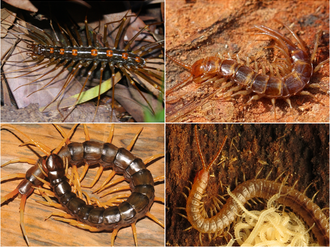Facing Your Fear: Tips for Managing Centipede Phobia

Have you ever shrieked at the sight of a centipede scuttling across the floor, sending shivers down your spine? You're not alone. Centipedes, those elongated creatures with seemingly endless legs, can trigger intense fear in many people.
This fear, known as centipede phobia or sometimes lumped in with Chilopodophobia (fear of Centipedes), can be quite debilitating, causing anxiety and even panic attacks at the mere thought of encountering these creepy crawlies.
But centipedes aren't out to bite you! In fact, they're beneficial predators that help control insect populations in our homes and gardens.
We'll delve into the world of centipede phobia, explore ways to understand your fear, and equip you with practical tips to manage it and reclaim your peace of mind.
Understanding Centipede Phobia
What is a Phobia?
A phobia is an irrational and persistent fear of a specific object, activity, or situation. It is a type of anxiety disorder that can cause significant distress and disruption in a person's life. Phobias are often triggered by a perceived threat, even when the actual danger is minimal or non-existent.
Causes of Centipede Phobia
Centipede phobia, also known as scolopendrphobia, is the fear of centipedes. There are several potential causes of this phobia:
- Traumatic Experiences: A person may develop a fear of centipedes if they have had a traumatic encounter with one, such as being bitten or feeling threatened by the creature.
- Cultural Influences: In some cultures, centipedes are seen as dangerous or even supernatural creatures, which can contribute to the development of a phobia.
- Learned Behavior: Centipede phobia can also be learned from family members or peers who have a fear of the creatures.
Symptoms of Centipede Phobia
Individuals with centipede phobia may experience a range of physical and psychological symptoms when confronted with a centipede or even the thought of one:
- Anxiety: Feelings of intense fear, worry, and unease.
- Panic Attacks: Rapid heartbeat, sweating, trembling, and difficulty breathing.
- Nausea: Feelings of sickness or discomfort in the stomach.
- Avoidance: Actively avoiding situations or places where centipedes may be present.
Facing Your Fear: Practical Tips

Exposure Therapy
Exposure therapy involves gradually increasing your exposure to the thing you fear, in this case, centipedes, in a safe and controlled environment. This could start with looking at pictures or videos of centipedes, then moving on to being in the same room as a centipede, and eventually handling one with supervision. The goal is to help you become more comfortable and less anxious around centipedes over time.
Relaxation Techniques
Practicing relaxation techniques, such as deep breathing, meditation, and mindfulness, can help you manage the anxiety and stress that may arise during exposure therapy. These techniques can calm your mind and body, making it easier to face your fear.
Cognitive Behavioral Therapy (CBT)
Cognitive Behavioral Therapy (CBT) is a type of therapy that can help you identify and challenge the negative thoughts and beliefs you have about centipedes. By restructuring these thoughts, you can reduce the fear and anxiety associated with them.
Seeking Professional Help
If you're struggling to overcome your fear of centipedes on your own, it's a good idea to seek the help of a therapist or other mental health professional who specializes in phobias. They can provide you with personalized guidance and support throughout the process of facing your fear.
Living with a Centipede Phobia
Prevention tips
To prevent encounters with centipedes in your home, it's important to seal any cracks or entry points where they might be able to get in. This includes checking around windows, doors, and pipes for any gaps or openings. Additionally, maintaining a clean and tidy environment can help discourage centipedes from taking up residence. Regularly sweeping, vacuuming, and removing clutter can make your home less appealing to these creepy crawlies.
Quick tips for managing sudden encounters
If you do happen to come across a centipede unexpectedly, it's important to stay calm. Centipedes are generally not aggressive towards humans and will typically try to avoid confrontation. If you encounter one, the best course of action is to slowly back away and call for help from someone else in your household. Avoid attempting to capture or kill the centipede yourself, as this may only serve to heighten your anxiety and fear.
Support groups and online communities
Living with a phobia can be a challenging and isolating experience, but you don't have to go through it alone. There are many support groups and online communities available for people with centipede phobias and other specific fears. These groups can provide a safe and supportive environment where you can share your experiences, learn coping strategies, and connect with others who understand what you're going through. Joining a group like this can be a valuable resource for managing your phobia and finding ways to overcome your fear.
Conclusion
Remember, centipede phobia, while disruptive, is absolutely treatable. With the right approach, you can significantly reduce your anxiety and live a phobia-free life. The key is to find what works best for you. This guide has hopefully equipped you with some valuable tools, but there's always more to learn.
For further information and support, consider exploring resources from the National Institute of Mental Health (NIMH) on Anxiety Disorders and phobia treatment options. Additionally, connecting with online communities or support groups specifically for people with phobias can provide a valuable network of understanding and encouragement.
Living with a phobia doesn't have to be a life sentence. Take the first step towards conquering your fear today.
